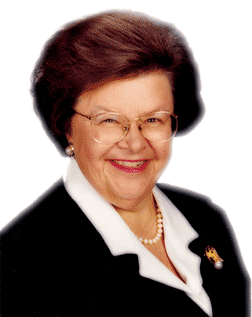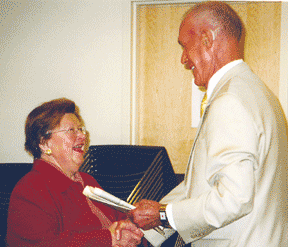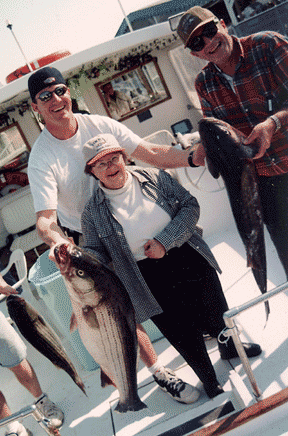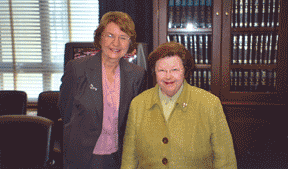 |
|||||||||||
|
|||||||||||
|
|||||||||||
Mikulski’s MilestoneAt 71, Maryland’s dynamo Barbara Mikulski celebrates 21 years in the Senateby Helena Mann-Melnitchenko
There was no mistaking four-foot 10-inch Sen. Barbara Mikulski. The Dean of Women Senators has served in the Senate longer than any other woman. On this hot day in August, the Senate was in recess, and Mikulski had gone shopping. Her eyes swept the room as she sailed like a schooner into the recesses of the store. The next time I saw her was another hot day, September 26, two years later at a Senate hearing, An Examination of the Impacts of Global Warming on the Chesapeake Bay. Her stature is anything but small, and her strong voice commanded the room. The Greatest ChallengeA small procedural drama played as James Inhofe (R–Okla.), who scoffs at global warming, protested Mikulski’s presence on the Senate Environment & Public Works Committee — where she is an outsider and he the ranking member. His objections were swept away by committee chair Barbara Boxer, (D–Calif.) and his own party’s John Warner (R–Va.). “This is an outrage. I am offended,” said Boxer, her gloves off. Boxer had invited Bay advocate Mikulski to ask witnesses what the federal government could do for them. “It’s not about me,” Mikulski said. “It’s about the Bay.” Vindicated, Mikulski rose to the dais, where Maryland’s new junior senator Ben Cardin awaited her. Opposite them were the two governors who share the Bay, Maryland’s Martin O’Malley and Virginia’s Tim Kaine. The hearing opened a dialogue among federal and state governments, scientists and Bay citizens on global warming, which Boxer called “the greatest challenge that we face today.” When Mikulski spoke, it was with her usual flair: “Global warming is not just about polar bears. It’s about the future of the planet itself. We’re looking at the possibility that our agriculture will be wiped out and there won’t be a Baltimore Harbor.” On the Commerce, Justice, Science Appropriation Committee, Mikulski has her hands on the purse strings of 85 percent of climate-change research. Mikulski’s quick eyes focused on the two governors, Eastern Shore Congressman Wayne Gilchrest and Smith Island Pastor Richard Edmund, as each testified to the problems global warming is already causing in their regions. Scientists got the same concentrated attention, as did president of the Chesapeake Bay Foundation William Baker. Politics proceeds on courtesies, and before Mikulski began questioning the witnesses, she complimented Warner as a champion on global warming. Concentrating on the economic issues of global warming, she asked Edmunds how rising levels of the Bay have dampened the economy of Smith Island. Economic issues are important to Mikulski. She comes from modest means. Baltimore to Washington “We all took care of each other,” Mikulski told Bay Weekly in an interview. “When times were tough, as when Bethlehem Steel laid off workers, my parents extended credit to those who needed it; if someone was having health problems, my mother always made sure there was food on their table till they could get back on their feet.” The Mikulskis sent their daughters to Catholic schools. Nancy Pelosi, now the powerful speaker of the U.S. House of Representatives, was a few “yearbooks younger” at the same high school, the Institute of Notre Dame, and the schoolgirls became friends. Mikulski continues to speak warmly of Pelosi and her family. “She was a big help in my election to the Senate,” Mikulski says. Twenty-one years ago, when the five-term U.S. Representative Mikulski ran for the Senate, Pelosi, just starting out as a congresswoman. Mikulski went to college in Baltimore, graduating with a B.A from Mount St Agnes College just before her 20th birthday. She returned to school a few years later, earning her Masters in Social Work from the University of Maryland. Many senators are born with silver spoons in their mouths and become lawyers. Mikulski did neither. Yet she rose to the nation’s most powerful and selective club, the U.S. Senate. The first woman elected state-wide in Maryland, she was also the first woman voted into the Senate on her own right, not on the coattails of a husband. She sits on the powerful Appropriations Committee, as well as Health, Education, Labor and Pensions and the Select Committee on Intelligence. How did she do it? “Through hard work and paying attention to the needs of my constituents,” she answers. “The work ethic and helping those who need help was very much part of my upbringing.” Mikulski started in politics in the Baltimore City Council. Elected in 1971, she served for five years. She mobilized Fells Point to block the construction of a highway through the historic neighborhood, preserving its integrity. Hearing the Voice of the People
Her Senate committee, Appropriations, gives her the power to fund issues she cares about. Governors O’Malley and Kaine both answered Mikulski’s question — “How can the federal government help the states?” — with a reply that surprised neither her or Inhofe: States need federal funding to redeem the Bay, they said. As the hearing wound down, four young girls stepped through the heavy, closed doors of the hearing room. Heads turned toward the prim row of girls at the back of the room, and Edmund explained that he wanted his grandchildren to see with their own eyes that he had tried to save the Bay. Mikulski noted their presence, taking it — like all else in the two-hour hearing — under advisement as one more reason to save the Bay.
The Way You Do the JobStatesmen filed through the Senate break room on their way to the floor of the Senate as I fiddled with my tape recorder and Mikulski’s aide, Kate Slusark, watched the television monitor for roll call. Mikulski swept into the room — full of energy, business and wit — to tell me about her job philosophy. Even in the brief chitchat about her background, her sense of humor bubbles up. “Some would say [to me], ‘your father sold baloney. So do you’,” she said, making a joke of her family background. She credits the family business, where she learned to always greet the customer with “Can I help you?” for developing her political skills. Mikulski got 65 percent of the vote in her last election. “The way you get elected is the way you do the job,” she said, recalling again the lasting power of her earliest lessons. “The way I went to Senate [was] because of the way I’d been a congresswoman. You don’t have to have the best hairdo or have the trendiest media consultant, but by doing the job.” Doing the job Mikulski-style means keeping in touch with the people. “First, I have to think about the day-to-day needs of my constituents,” she said, “whether it’s affording health care, access to higher education, being able to help an elderly parent with prescription drugs or long-term care — and what does that mean for national policy.” She thinks government is on the right track when it’s smart about how it helps families. “Is it part of the American fabric, part of the American Dream?” That’s her test of good government. While she keeps one foot in the neighborhood, she keeps her other foot on the Hill. She’s passionate about the Senate’s constitutional authority to advise and consent on treaties and presidential appointments. “We have the long-range planning for our country: national security, how we can be a safer country? How we can have a stronger economy? And how we can participate in the global marketplace?” she said. “Everything from getting our country ready, our children ready for the new economy and also fighting the global war against terrorism.” Capital Hill politics is so much of her life that it invades her creative dreams. Her 1996 novel, Capitol Offense (cowritten with Marylouise Oates) is a political mystery about who is trying to harm a newly appointed woman senator. Which of the two female senators, Norie Gorzak, the young new senator, or Hilda Mendelssohn, the elder stateswoman, is her alter ego? She’s both, she says, Norie in her world-view, and Hilda, as a mentor to other women senators. Hilda, by the way, is a very tall woman. Capitol Offense has a lot to do with another class of people Mikulski champions: veterans, and specifically Vietnam MIAs. “A lot of that has been resolved … [though] there are still people missing in action, and we’ll need to press that until we can find any and all that are there,” she said. As we are embroiled in a new war, all the issues of fighting men and women are her fight. Just as I ask about how she got to be a very powerful senator, having three strikes against her — being a woman, a woman of the people and a woman who’s not a lawyer — the Senate announcer calls for roll call to start in 15 minutes. I ask my last question about Speaker Pelosi. Mikulski is happy to get into that subject. Not only were the women friends, Pelosi’s father and brother were mayors of Mikulski’s hometownof Baltimore. At St Leo’s ravioli dinners, Pelosi’s mother had Mikulski seated at her table. “That was like you were going to sit with the Queen Mother,” the senator fondly recalls. When Pelosi moved on to California and married, the two women stayed in touch. Now, Mikulski is proud of a friend who’s achieved another first for women, rising to the most powerful position in Congress’s other chamber, the U.S. House of Representatives. “Her leadership is truly making a difference in our country and she’s certainly working for change,” Mikulski says. Mikulski has exactly 12 minutes to make it to the floor, but she delays a moment longer to pose for a photo with this constituent. Call Her Barbara
Mikulski makes it her business to visit Maryland counties to listen to people’s concerns. Over the last month or so, Mikulski has traveled into rural Maryland to meet with local politicians and journalists. In Charles County, she also met with college students to hear their concerns about tuition, and she listened to worries about traffic that is snarling the roads. The Queen Anne meeting was celebratory: heralding the arrival of high-speed Internet via fiber-optic cables laid underneath the Bay Bridge and promising federal money to help bring the same quality service from NASA at Wallops Island to Salisbury and points in between. In Calvert County, she focused on the security of Calvert Cliffs Nuclear Power Plant and Dominion’s Cove Point liquefied natural gas plant, both seeking expansion. On October 15, Calvert County commissioners and most other politicians called her Barbara. She was relaxed, greeting those she knew, joking when shown a picture of herself with ever-thin former State Sen. Bernie Fowler. “That was 20 pounds ago. Some people follow the South Beach diet,” she said, I follow the North Beach diet.” She had toured North Beach and Chesapeake Beach after Hurricane Isabel slammed into the towns. When County Commissioner Susan Shaw brought up the possibility of turning unused military housing into county-owned low-income housing, Mikulski replied with her trademark wit: “Before you see it as a golden goose, make sure it’s not braunschweiger.” The meeting erupted in laughter. Then she got very serious. Could Homeland Security appropriate funds for the safety of the nuclear and LNG plants? “No,” she said, explaining that that agency is “like the many-headed Hydra, steeped in bureaucracy.”
Who is This Barbara?Bay Weekly saw three Barbaras: a woman shopping for a bargain, a senator at work on the Hill and a senator among the people. In every instance, she was relaxed, she listened and she stood on no ceremony, explaining plainly what can and cannot be done. Telling it like it is. At 71, Barbara Ann Mikulski, a grocer’s daughter with deep ethnic roots, was elected to the Senate 21 years ago this week and is still going strong. Only in America. Helena Mann-Melnitchenko was brought to this country by her parents when she was 11 years old. Ukrainian is her first language, Polish her second, English her third, with French and Russian coming later.
|
|||||||||||
|
|||||||||||
|
|
|||||||||||
|
© COPYRIGHT 2007 by New Bay Enterprises, Inc. All rights reserved.
|
|||||||||||

 She burst through the doors of the Jones New York outlet on the Eastern Shore like a small whirlwind. “Hi, Barbara,” said the saleswoman to the woman, dressed in slacks and a shirt, a baseball cap low on her head. “How you been?”
She burst through the doors of the Jones New York outlet on the Eastern Shore like a small whirlwind. “Hi, Barbara,” said the saleswoman to the woman, dressed in slacks and a shirt, a baseball cap low on her head. “How you been?” Barbara Ann Mikulski was born on July 20, 1936, in the ethnically diverse neighborhood of East Baltimore, the eldest of three daughters. A great granddaughter of Polish immigrants who owned a bakery, she went to work young in her parents’ grocery store. One of her duties was to deliver groceries to housebound elderly — the genesis of her interest in social work and her particular attention to senior citizens.
Barbara Ann Mikulski was born on July 20, 1936, in the ethnically diverse neighborhood of East Baltimore, the eldest of three daughters. A great granddaughter of Polish immigrants who owned a bakery, she went to work young in her parents’ grocery store. One of her duties was to deliver groceries to housebound elderly — the genesis of her interest in social work and her particular attention to senior citizens. In the 21 years she’s been a senator, Mikulski has made the whole state of Maryland her neighborhood. So Chesapeake Bay has become as important to her as the social issues she’s cared about all her life. Her interest in the Bay is more than environmental. She’s a working-class senator who draws her strength from identification with people whose survival depends on vital local economies.
In the 21 years she’s been a senator, Mikulski has made the whole state of Maryland her neighborhood. So Chesapeake Bay has become as important to her as the social issues she’s cared about all her life. Her interest in the Bay is more than environmental. She’s a working-class senator who draws her strength from identification with people whose survival depends on vital local economies.